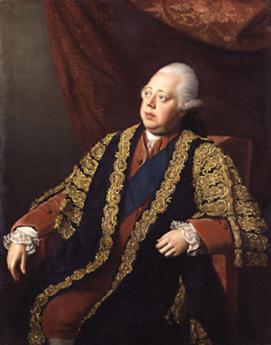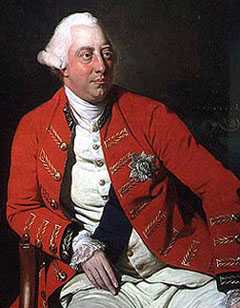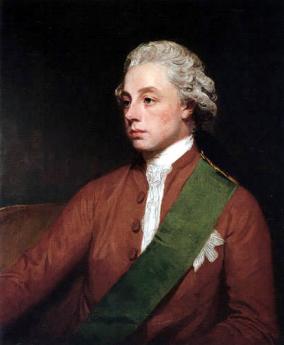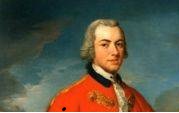Related Topics
The British Attack Philadelphia
Fighting in the Revolutionary War lasted eight years; for two years (June 1776 to June 1778) Philadelphia was the main military objective of the British.
Peace, Disdained

|
| Lord North |
The most decisive victory of the Revolutionary War was the Battle of Saratoga, where the British lost an entire army at a critical moment. Before Saratoga, Colonial hopes were at a low point. The British then occupied Philadelphia and Washington was shivering in Valley Forge. It's probably of relevance that the Continental Congress had fled to Baltimore, then York, and Robert Morris was trying to manage the mechanics of government from Manheim, near Lancaster. Within occupied Philadelphia, the dominant Quaker population had largely abandoned involvement in politics, and although there were a handful of wealthy merchant leaders living on 3rd Street, it's questionable how much the populace listened to them. Mayor Samuel Powel, for example, was so wealthy he didn't much care who won the war and spent much of his time entertaining notable foreign visitors.

|
| King George III |
Defeats have consequences, and the loss at Saratoga resulted in the British replacing General Howe with General Henry Clinton. A French fleet poked at New York harbor before giving the idea up and settled on attacking Newport, Rhode Island. Although this initiative ended in a draw because of what was probably an Atlantic hurricane, it was not at all a far-fetched idea that the French fleet might position itself anywhere on the Atlantic coast. Blocking the mouth of Delaware Bay would strand Howe's army a hundred miles upriver, with Washington's newly trained troops on the far side, cutting off supplies from the countryside. It would be a precarious position, so Lord North not only replaced General Howe but ordered the abandonment of Philadelphia. General Clinton thus had an orderly retreat from Philadelphia as his first priority and was occupied preparing for it.

|
| Earl of Carlisle |
This was not merely a low point for the British in America. They were now also fighting world-wide wars without allies, against France, Spain, Holland, and lesser principalities. These enemies of England were making trouble, busily planning more of it. The conquest of India was in question, the West Indies Sugar islands were widely regarded as more economically important than the thirteen colonies to their north. France was organizing an invasion of the British Isles by a Second Armada in 1779, and there was to be serious rioting in the streets of London in 1780 when the Protestant Association under George Gordon reacted badly to Parliament relaxing the Catholic restraints. Behind the Gordon riots was another ominous fact; British manpower was overstretched and could use more sources of troops. Even though Lord North bore such a striking physical resemblance to King George III that it was widely rumored they were secretly brothers, the North Prime Ministry was in serious trouble. Lord North called in the thirty-year-old Earl of Carlisle and dispatched him to America to negotiate peace. His terms were essentially the ones considered for Ireland: the colonies could have a parliament of their own, in return for maintaining trade relationships with England. It was not an unreasonable time for the British to stop the war, and the terms they offered seemed to satisfy every demand the irate colonists had asked for. Behind the slogan "No taxation without representation", lay more than a century of amicable relations with the colonies, restless at most that they had not been fully treated like Englishmen. Lord North had every reason to believe these terms would be acceptable, and many reasons of his own to be done with the Colonial quarrel. The counterfactual is that if the offer had been accepted, the Revolutionary War would have ended six years earlier than it did, without much difference in the final terms, and the War of 1812 would never have happened; history would surely have applauded North's statesmanship. Unfortunately, there was not much preparation for this peace overture, and there was really no obvious power structure in America at that moment to deal with it. It seems possible the Earl of Carlisle encountered some random handful of Americans who wanted independence more than they wanted peace or British officers who wanted revenge. But it also appears likely this thirty-year-old guardian of a famous poet simply was not equal to the momentous challenge he faced. The available history is too scanty to judge.

|
| General Clinton |
All we now know for certain is that the Earl of Carlisle showed up in Philadelphia with an entourage, and the town mansion of Samuel Powel (not to be confused with his country place called Powelton) was commandeered, pushing the Powel family into the servants quarters. Carlisle hung around for two weeks while General Clinton was packing up, essentially got nowhere with his mission, and went back home. There's surely some astounding story behind these events; somebody on the Rebel side must have been approached, and the terms may not have suited him. Since the same offer was made four years later and more emphatically rejected, there surely were people around 3rd Street who found it easy to let the matter die. If anyone is young and energetic enough to dig into the papers of the time, this episode would at least be an excellent subject for a thesis.
Originally published: Monday, September 05, 2011; most-recently modified: Friday, May 31, 2019